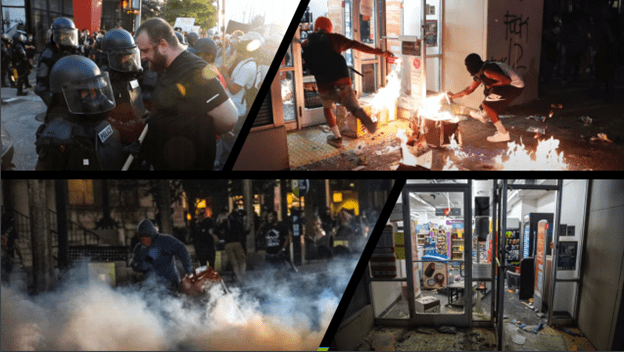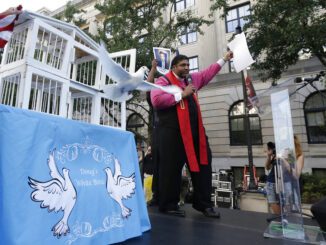RALEIGH — During May and June 2020 amid COVID-19 lockdowns, Black Lives Matter protests broke out in U.S. major cities over the death of George Floyd. By night, those protests turned into violent riots. The four-year anniversary of those riots is now here.
Cities in North Carolina had protests by day and riots by night over May 30-31 and again on June 2. The rioting in Raleigh included extensive property damage, arson, looting and attacks on police.
During the riots on May 31, House Speaker Tim Moore (R-Eden) filmed the chaos from his apartment in Raleigh. That night, Moore called on Gov. Roy Cooper to deploy the National Guard.
“I am witnessing utter lawlessness firsthand in downtown Raleigh,” Moore said in one of several videos taken from his residence that night that he posted to social media.
The National Guard were seen in downtown Raleigh after midnight, but by then the riots had spread beyond downtown.
Cooper did not immediately respond publicly and did not address the public until 4 p.m. the following day during a June 1 COVID briefing, during which Cooper said the focus shouldn’t be property damage.
“I fear the cry of the people is being drowned out by the noise of riots,” he said. “We must stop this destruction. But I want to remind everyone of something vitally important: We cannot focus so much on property damage that we forget why people are in the streets in the first place. Black lives do matter.”
Cooper had allegedly met privately with Black Lives Matter (BLM) protesters prior to the briefing. The same day, the governor also marched with BLM protesters around the Executive Mansion — arguably in violation of his own pandemic restrictions such as social distancing and mask mandates.
Two groups behind the BLM protests in Raleigh that allegedly met with Cooper included Carolina Peace Center, led by Faisal Khan, and Living Ultra-Violet, a group led by Conrad James.
Both groups claimed to be peaceful, yet James has a criminal record going back to 2012 and has had nine arrests during and after the 2020 protest. Charges ranged from possession of drugs and trespass to resisting arrest, injury to property and filing false police reports. He was charged with felony incitement of a riot three times in the past four years: June 2020, October 2021, and February 2023.
That same day as the June 1 COVID briefing, Senate Leader Phil Berger (R-Eden) issued a statement blasting Cooper’s response as a “failure of leadership” and was critical of the governor’s uneven handling of the protests.
“If you’re a tattoo artist trying to reopen your business, you’ll be arrested in front of a TV camera as a ‘show of force.’ But if you burn that tattoo parlor to the ground, you’ll face no consequence,” Berger’s statement said in part.
NSJ coverage of riots highlighted how the governor handled the two types of protests differently, including failing to meet with ReOpen NC, which at the time had around 80,000 members in its Facebook group.
Raleigh Police’s handling of ReOpen NC was different as well.
On April 14, 2020, during the first ReOpen NC protest, the Raleigh Police tweeted: “Protesting is not an essential activity.” The tweet was subsequently deleted after drawing national attention.
The tweet drew strong backlash, and a statement from U.S. Rep. Dan Bishop (R-N.C.) blasted the tweet while backing ReOpen NC’s First Amendment rights to protest. Bishop is currently the Republican candidate for North Carolina attorney general.
Additionally, several ReOpen NC protesters were arrested for stepping onto the sidewalk in front of the Executive Mansion and violating Cooper’s pandemic orders.
One ReOpen NC protester, Monica Ussery, was targeted by Raleigh Police in what leaked body cam footage showed as an apparent staged arrest to deter future protests. Ussery spent the better part of three years battling her arrest charges in court.
While rioters had burned businesses, smashed windows, inflicted property damage and caused substantial damage to police vehicles, the initial arrests were never itemized by the Raleigh Police Department. Even after Raleigh Mayor Mary-Ann Baldwin instituted a curfew, no specific arrest totals are mentioned in the Raleigh Police After Action Report issued in October 2020.

Per the U.S. Department of Justice, Richard Rubalcava was a riot arrestee who was federally convicted in 2021 for looting and setting multiple fires in Raleigh during the May 30 riot. He is serving a seven-year sentence in a high-security federal prison in Victorville, California, with a scheduled release date of Aug. 5, 2026.
Another man, Jabari Devon Davis, was charged and later convicted of attempting to destroy a Raleigh Police SUV by setting fire to it in the early hours of May 31, 2020. He had used a Molotov cocktail and tossed it at police cars in the lot at the Raleigh Police Southeast District Station.
Following the riots in Raleigh, Moore made it a priority to pass legislation strengthening penalties for rioters. House Bill 40, titled “Prevent Rioting and Civil Disorder,” passed both chambers with some Democratic support.
House Bill 40 was nearly identical to Moore’s 2021 attempt; House Bill 805. Cooper vetoed 805, stating in part the bill was “unnecessary” and “intended to intimidate and deter people from exercising their constitutional rights to peacefully protest.”
The cost of the riots was steep, ranging in the millions in North Carolina alone.
The Associated Press had reported that around $2.2 million was spent by law enforcement to cover the protests and nightly rioting in the state. Costs NSJ obtained by records requests include:
- Raleigh Police — $1.4 million
- Activation of the National Guard — $725,000
- NC Highway Patrol — $300,000-plus
- Wake County Sheriff — $400,000
- State Capitol Police — $48,000-plus
- Alcohol Law Enforcement officers — $27,000 in overtime pay
To date, no North Carolina lawmakers have held a hearing on the riots, requested details of those who were arrested, investigated the costs involved or questioned the initial response by Cooper.



